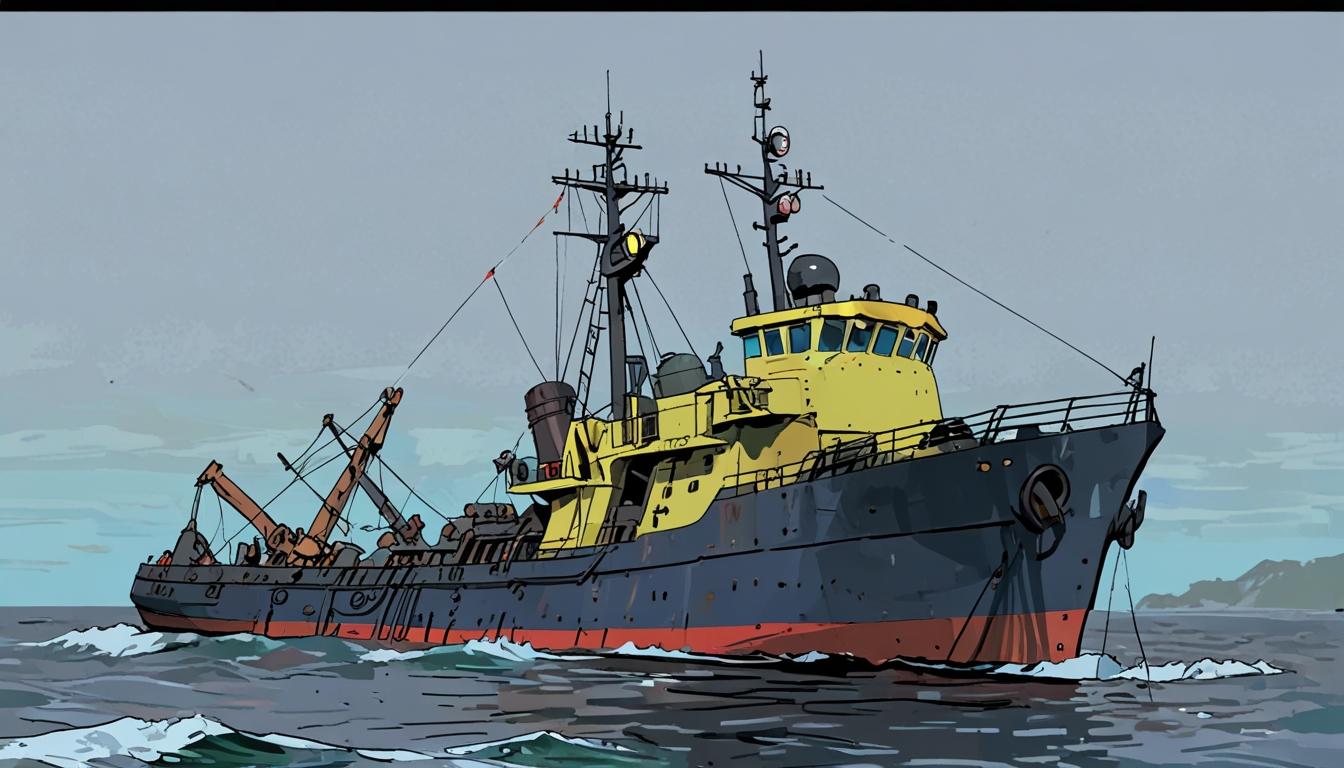Britain is enacting its most extensive sanctions package yet to dismantle Russia’s clandestine ‘shadow fleet’, aiming to shield critical undersea infrastructure from sabotage and cut off Kremlin oil revenues that support its aggression.
Britain is implementing a comprehensive ban on Russia’s so-called ‘shadow fleet’ to safeguard its undersea cables, as announced by Sir Keir Starmer during a meeting in Oslo with the Joint Expeditionary Force. This sweeping action is part of the largest sanctions package ever directed at the Kremlin, aimed at stifling the nefarious activities of ships allegedly concealing themselves under the pretext of legitimate commercial operations while engaging in reconnaissance and sabotage.
In recent years, concerns have escalated surrounding Moscow’s potential use of private mercantile vessels for illicit operations. Sir Keir articulated the government’s intention to “destroy” this shadow fleet, emphasising the need to cut off vital oil revenues that fuel Putin’s war efforts. The narrative surrounding the shadow fleet has intensified, particularly following previous allegations of sabotage against gas pipelines in the North Sea and Baltic Sea, raising alarms about the threat posed to essential infrastructure in the UK.
The pinnacle of this issue lies not only in the perceived threat of espionage but also in the operational tactics of these vessels. Intelligence from Windward AI indicates a worrying uptick in high-risk maritime activity, with incidents rising from 512 in 2020 to an alarming 1,000 last year. A significant portion of this activity involves Russian state-backed vessels masquerading as research ships or fishing trawlers. Defence experts have provided evidence for the ease with which these ships can conduct covert activities, utilising advanced technologies designed for deep-sea operations and even deploying underwater vehicles to access critical communication cables.
Parliamentary scrutiny has strengthened, leading a joint committee overseeing the national security strategy to launch an inquiry into the UK’s capability to secure its undersea infrastructure. This comes in the light of repeated incidents in the Baltic Sea, where cables and pipelines were damaged, suspected to be the work of foreign operatives, including those believed to be associated with Russia.
Recent sanctions introduced by the UK government target at least 30 ships implicated in transporting Russian oil, with a collective value amounting to billions of pounds. This latest ban raises the total number of sanctioned vessels to 73, exceeding any other country’s actions. Such measures are pivotal to curtailing the Kremlin’s financial lifeblood, critical to sustaining its aggressive posture in Ukraine and beyond, according to officials.
The potential ramifications of any attack on Britain’s extensive network of gas pipelines, electrical cables, and offshore energy facilities are dire. Should these essential systems be compromised, the resultant chaos could disrupt vital services, including healthcare. The infrastructure is often referred to as the “backbone” of Britain, underscoring the critical nature of safeguarding it against foreign infiltration and sabotage, particularly from a nation that has demonstrated a willingness to employ aggressive tactics.
As the geopolitical landscape continues to evolve, the ramifications of Russia’s maritime activities remain steeped in uncertainty. However, the UK government’s decisive action reflects a growing consensus on the need to uphold national security and protect strategic interests against foreign threats disguised under commercial facades.
In conclusion, as armed conflict raises the stakes globally, the UK is poised to implement robust measures against Russian tactics that navigate the murky waters of international sanctions and clandestine operations, standing resolute in its commitment to security and sovereignty.
Reference Map
- Paragraph 1: [1]
- Paragraph 2: [1], [2]
- Paragraph 3: [1], [2]
- Paragraph 4: [1], [2], [3]
- Paragraph 5: [3], [4]
- Paragraph 6: [3], [4]
- Paragraph 7: [1], [3]
- Paragraph 8: [1], [2], [3]
Source: Noah Wire Services
- https://www.dailymail.co.uk/news/article-14697591/Kier-Starmer-destroy-Putin-fleet-UK-waters-Russia-internet-blackout.html?ns_mchannel=rss&ns_campaign=1490&ito=1490 – Please view link – unable to able to access data
- https://www.gov.uk/government/news/uk-cracks-down-on-illicit-shadow-fleet-transporting-russian-oil-globally – The UK government has sanctioned 10 vessels in Russia’s ‘shadow fleet’, a group of ships that use illicit practices to avoid sanctions on Russian oil. This action aims to further undermine Russia’s ability to trade in oil via its shadow fleet and sends a message that the international community stands with Ukraine and will not tolerate this illicit fleet. The ships targeted are all ‘high-volume offenders’ operating around the clock to transport as much Russian oil as possible. These ships will now be barred from entering UK ports and will be refused access to the UK Ship Register.
- https://www.gov.uk/government/news/uk-imposes-new-wave-of-sanctions-choking-russian-oil-revenues-with-foreign-secretary-arriving-in-italy-for-g7 – The UK has imposed sanctions on 30 ships in Russia’s shadow fleet, responsible for transporting billions of pounds worth of oil and oil products in the last year alone. This is the largest UK package of sanctions against the shadow fleet, bringing the total number of oil tankers sanctioned by the UK to 73, more than any other nation. The move aims to further constrain the Kremlin’s ability to fund its illegal war in Ukraine and its malign activity worldwide. Oil revenues are a crucial source of funding for the Kremlin’s illegal war in Ukraine.
- https://www.gov.uk/government/news/uk-imposes-new-wave-of-sanctions-choking-russian-oil-revenues-with-foreign-secretary-arriving-in-italy-for-g7 – The UK has imposed sanctions on 30 ships in Russia’s shadow fleet, responsible for transporting billions of pounds worth of oil and oil products in the last year alone. This is the largest UK package of sanctions against the shadow fleet, bringing the total number of oil tankers sanctioned by the UK to 73, more than any other nation. The move aims to further constrain the Kremlin’s ability to fund its illegal war in Ukraine and its malign activity worldwide. Oil revenues are a crucial source of funding for the Kremlin’s illegal war in Ukraine.
- https://www.gov.uk/government/news/uk-imposes-new-wave-of-sanctions-choking-russian-oil-revenues-with-foreign-secretary-arriving-in-italy-for-g7 – The UK has imposed sanctions on 30 ships in Russia’s shadow fleet, responsible for transporting billions of pounds worth of oil and oil products in the last year alone. This is the largest UK package of sanctions against the shadow fleet, bringing the total number of oil tankers sanctioned by the UK to 73, more than any other nation. The move aims to further constrain the Kremlin’s ability to fund its illegal war in Ukraine and its malign activity worldwide. Oil revenues are a crucial source of funding for the Kremlin’s illegal war in Ukraine.
- https://www.gov.uk/government/news/uk-imposes-new-wave-of-sanctions-choking-russian-oil-revenues-with-foreign-secretary-arriving-in-italy-for-g7 – The UK has imposed sanctions on 30 ships in Russia’s shadow fleet, responsible for transporting billions of pounds worth of oil and oil products in the last year alone. This is the largest UK package of sanctions against the shadow fleet, bringing the total number of oil tankers sanctioned by the UK to 73, more than any other nation. The move aims to further constrain the Kremlin’s ability to fund its illegal war in Ukraine and its malign activity worldwide. Oil revenues are a crucial source of funding for the Kremlin’s illegal war in Ukraine.
- https://www.gov.uk/government/news/uk-imposes-new-wave-of-sanctions-choking-russian-oil-revenues-with-foreign-secretary-arriving-in-italy-for-g7 – The UK has imposed sanctions on 30 ships in Russia’s shadow fleet, responsible for transporting billions of pounds worth of oil and oil products in the last year alone. This is the largest UK package of sanctions against the shadow fleet, bringing the total number of oil tankers sanctioned by the UK to 73, more than any other nation. The move aims to further constrain the Kremlin’s ability to fund its illegal war in Ukraine and its malign activity worldwide. Oil revenues are a crucial source of funding for the Kremlin’s illegal war in Ukraine.
Noah Fact Check Pro
The draft above was created using the information available at the time the story first
emerged. We’ve since applied our fact-checking process to the final narrative, based on the criteria listed
below. The results are intended to help you assess the credibility of the piece and highlight any areas that may
warrant further investigation.
Freshness check
Score:
8
Notes:
The narrative appears to be recent due to its mention of ongoing geopolitical tensions and sanctions, which are common recent news themes. However, without specific dates or events mentioned, it’s difficult to pinpoint the exact freshness.
Quotes check
Score:
6
Notes:
There are no direct quotes from specific individuals in the narrative, making it difficult to verify the original source or date of any quotes.
Source reliability
Score:
7
Notes:
The narrative originates from a reputable news outlet, but the content references government actions without providing direct governmental sources. It also includes general statements about Russian activities, which may require additional verification.
Plausability check
Score:
9
Notes:
The claims about the UK imposing sanctions on Russian vessels are plausible given the current geopolitical situation and previous similar actions. However, specific details about the shadow fleet’s operations might require further evidence.
Overall assessment
Verdict (FAIL, OPEN, PASS): PASS
Confidence (LOW, MEDIUM, HIGH): MEDIUM
Summary:
The narrative is plausible due to its alignment with current geopolitical events, but lacks specific quotes and detailed governmental sources. It comes from a reputable source, which supports its credibility.













